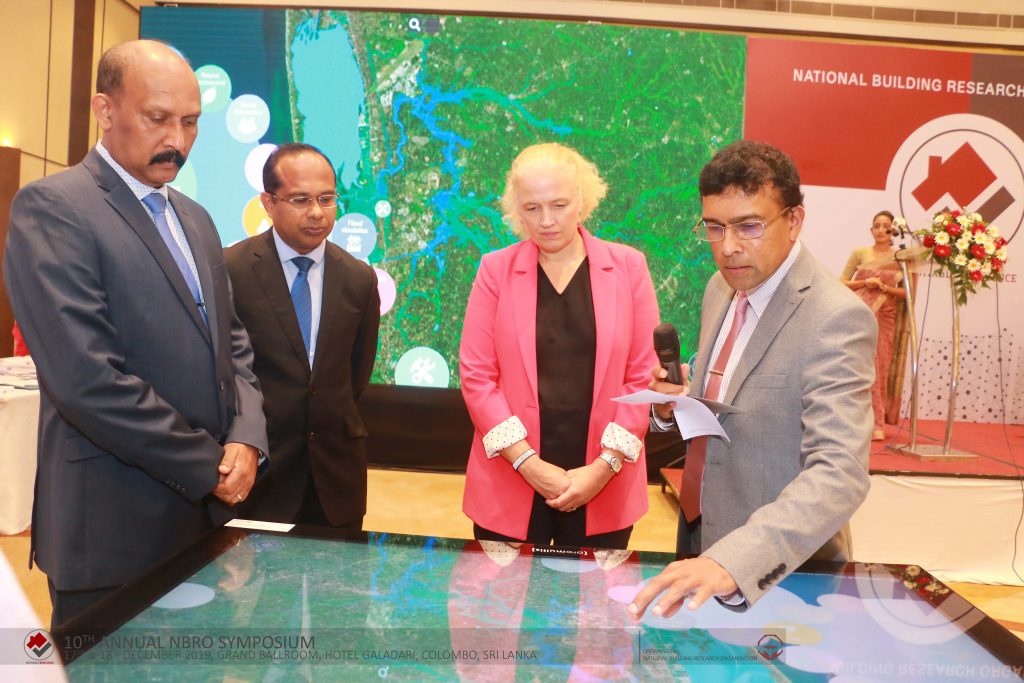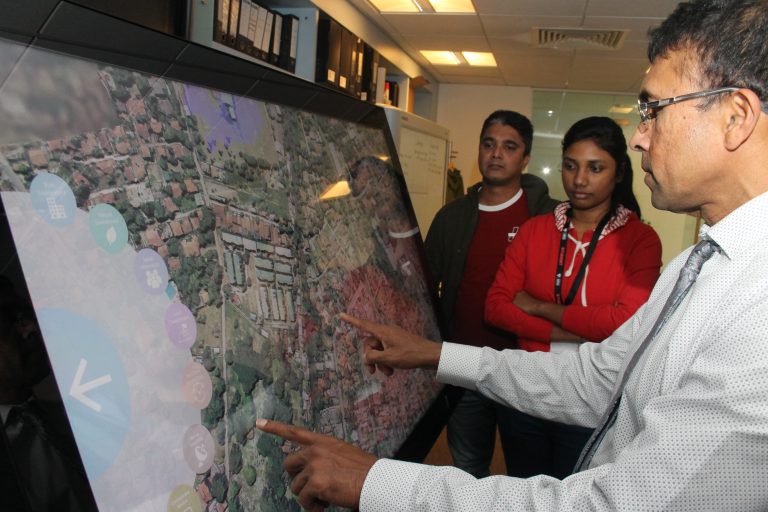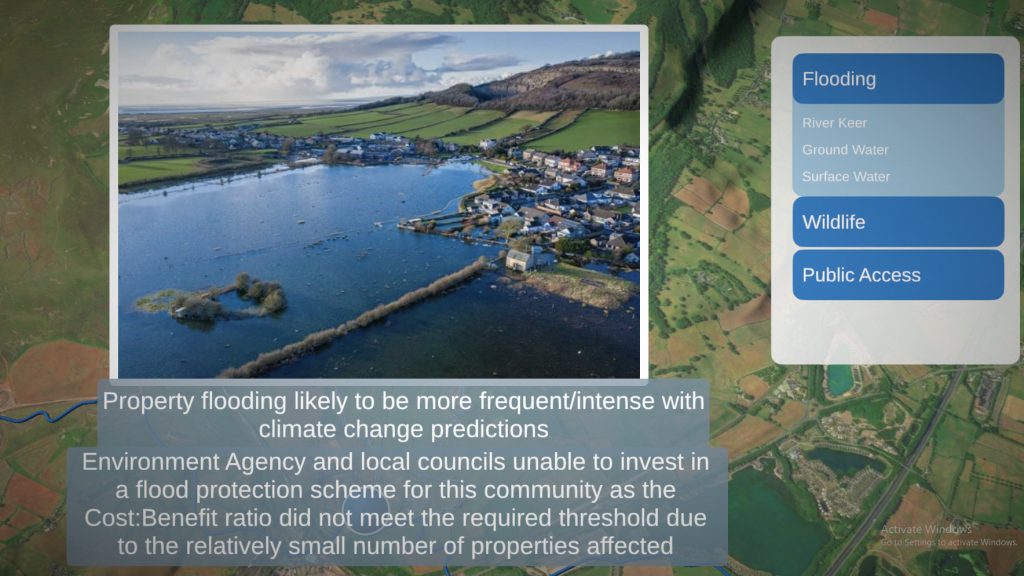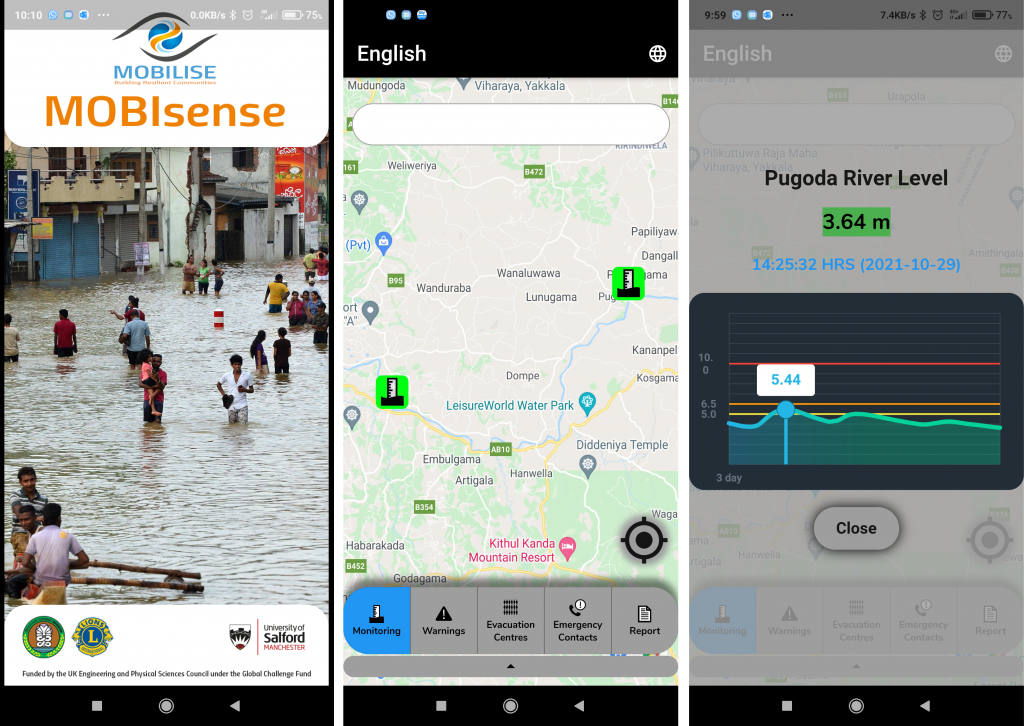As part of the COP26 programme of events, the Director of THINKlab, Professor Terrence Fernando, talks about some of the current projects which support Monday 8 November and the theme: Adaptation, Loss and Damage.
As an innovation hub, THINKLab develops digital technology that helps solve global challenges, most notably in disaster risk reduction and building resilience through technology-enhanced stakeholder collaboration and evidence-based decision making.
“The Intergovernmental Panel on Climate Change reports that hazards such as floods, landslides, heatwaves, wild-fire and storm surges will continue to exacerbate and cause a direct impact on the economy, food and water security, as well as citizen’s health.
The risk level posed by climate change on urban environments will depend on how climate adaptation and resilient measures are implemented by a local stakeholder to safeguard physical, social and environmental infrastructures. Local government agencies must consider climate resilience measures and make complex trade-offs in their decision-making for land-use management and urban development. They must take a long-term climate risk view while considering climate change adaptation, equitable resilience and ecological integrity.
The knowledge and collaboration required for such complex decisions span many scientific and engineering disciplines and government agencies, requiring an interdisciplinary approach. Currently, the decision-making for addressing climate change are happening in silos conducted by different agencies, institutions and other actors with differing priorities, perspectives and time horizons. There is a weak interdisciplinary collaboration among the scientific community to produce decision-making tools built on scientific simulation and modelling services which can help government agencies to understand the future climate scenarios and the impact on land, the economy, ecology and urban infrastructures.
Sustainable Development Goals, which call for “reduced inequalities”, “inclusive, safe, resilient and sustainable cities”, and “partnerships for goals” are therefore difficult to achieve due to current practices and policies. Consequently, we believe that there is an urgent need to transform current practices for tackling climate change adaptation, involving relevant scientific disciplines, government institutions, NGOs, private companies and communities to develop a sustainable and resilient urban environment for the future.
The THINKlab is working with government organisations, academic institutes and NGOs in Sri Lanka, Pakistan and Malaysia to develop technology solutions. These promote a collaborative approach for analysing the impact of climate-induced hazards and debating climate-risk trade-offs so development plans can be chosen which offer sustainable and equitable solutions. Our research produces tools that allow government agencies to establish a shared risk information space and conduct risk exploration through an interactive visual interface. It simulates the impact of future hazard scenarios and collects hazard information to raise timely warnings. This research has been possible thanks to the Global Challenges Research Funds from the UK Government and managed by EPSRC and ESRC”.

Stakeholder collaboration with MOBILISE 3.0
Natural disasters such as floods, landslides and drought are becoming more frequent due to climate change and global warming.
At THINKLab, we are helping to solve these global challenges by working with stakeholders and vulnerable communities to strengthen their digital capacity in understanding the local risks and implementing climate adaptation and resilience measures.
The MOBILISE and TRANSCEND digital platforms are helping them to implement new partnership models, participatory approaches, and digital solutions to anticipate future climate threats and create interventions that can build resilient communities.
Read more about the Digital Toolset, which is helping worldwide stakeholders be more assertive when faced with uncertainties.

Community engagement
It is crucial to consider the community as an active participant rather than a passive beneficiary when we make climate adaptation and resilience measures. The local knowledge, concerns and visions should be considered when strengthening local resilience against climate change.
The THINKlab’s MOBILISE and TRANSCEND projects are working with international stakeholders to develop methods and tools to overcome the barriers in community engagement in local development projects and become an equal partner in the decision-making process.
Community Engagement for Creating Nature-based Solutions – Warton MiresIt is essential to adopt a holistic approach when making local environments resilient to hazards such as flooding. There is an opportunity for local stakeholders to consider nature-based solutions for risk mitigation while enhancing biodiversity through wetland habitats and improving the physical and mental wellbeing of the local community.
Closer to home, THINKlab is working with the Royal Society for the Protection of Birds (RSPB) in Carnforth, Lancashire, to develop a community engagement platform that allows stakeholders to co-develop nature-based solutions which are reversing the decline of wildlife.
Read more about the project.

Early Warning
Timely and efficient communication of early warnings of potential disasters to the citizens is critical for saving lives. Modern technologies such as IoT (Internet of Things) sensors and satellites allow disaster management agencies to continuously monitor pre-hazard conditions such as rainfall, river level and soil moisture and issue accurate early warnings to the community well in advance.
THINKlab has produced an early warning system that allows agencies to collaborate in issuing early warnings to the community after analysing the intelligence gathered through IoT sensors by working with government organisations and NGOs in Sri Lanka.
Read more about our work with the National Building Research Organisation (NBRO) in Sri Lanka and how MOBILISE 3.0 is helping them to strengthen their institutional capacity of disaster management so they can send timely warning messages during natural disasters.

Drone environment for landslide mitigation
THINKlab’s innovative MOBILISE 3.0 Drone Inspector is changing how its users can implement landslide mitigation plans and support post-disaster reconstruction efforts.
The Drone Inspector platform allows the engineers and the decision-makers to scan landslide-prone areas using drones and construct a virtual environment to collectively develop mitigation plans and conduct remote monitoring of the construction activities.
The platform is being used by NBRO to support the development of landslide mitigation plans for over 100 sites across Sri Lanka.”
Read more about how the team have developed this.